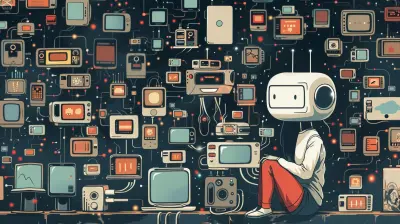How Quantum Computing Could Revolutionize Artificial Intelligence
5 June 2025
Artificial intelligence (AI) has come a long way, shaping industries, optimizing processes, and making predictions that once seemed impossible. But AI, as powerful as it is today, still struggles with complex computations, slow processing speeds, and energy inefficiencies. This is where quantum computing enters the scene, promising to push AI beyond its current limitations.
So, how exactly could quantum computing revolutionize AI? Let’s dive deep into this fascinating topic and see what the future might hold. 
📌 Understanding Quantum Computing
Before we talk about how quantum computing will supercharge AI, let's first break down what quantum computing actually is.Traditional computers rely on bits, which can be either 0s or 1s. These bits are the basic units of digital information. Now, imagine if bits could exist in multiple states at the same time—this is exactly what quantum bits (qubits) do.
Thanks to two core principles of quantum mechanics—superposition and entanglement—quantum computers can process an astronomical number of computations simultaneously.
- Superposition: Unlike classical bits, which are either 0 or 1, qubits can be in a state of both 0 AND 1 at the same time. This allows quantum computers to perform multiple calculations at once.
- Entanglement: When two qubits become entangled, changing the state of one instantly affects the other, no matter how far apart they are. This allows for ultra-fast information transfer and complex problem-solving.
Now, imagine applying this power to artificial intelligence. The impact could be groundbreaking. 
🚀 How Quantum Computing Could Transform AI
Quantum computing has the potential to revolutionize artificial intelligence in several ways. Let’s break down some of the most exciting possibilities.1. Supercharging Machine Learning
Machine learning (ML) is at the heart of modern AI, but training models can take days or even weeks on conventional computers. Quantum computers, with their ability to process massive amounts of data simultaneously, could reduce training times from weeks to mere minutes.- Faster Data Processing: Quantum machines can analyze vast datasets in parallel rather than sequentially.
- Improved Pattern Recognition: AI systems powered by quantum computing can detect complex patterns that classical computers might miss.
For example, Google’s Sycamore quantum processor has already demonstrated how quantum systems can outperform classical ones in specific computational tasks. Imagine applying that power to machine learning—AI could evolve at an unprecedented rate.
2. Optimizing Neural Networks
Neural networks—the backbone of deep learning—require intensive computational resources. Quantum computing could redefine how these networks operate:- Efficient Model Optimization: Quantum algorithms can optimize neural networks much faster than classical algorithms.
- Better Decision-Making: AI-powered by quantum computing could make more accurate predictions by exploring multiple solutions at once.
This means that industries like healthcare, finance, and cybersecurity could benefit from AI models that are not only faster but also far more precise.
3. Handling Big Data More Efficiently
The world generates tons of data every second. Traditional computers struggle to process and analyze massive datasets efficiently.Quantum computing changes the game by:
- Processing big data at an unprecedented speed
- Extracting valuable insights in real-time
- Enhancing AI-driven decision-making systems
For instance, in the finance sector, AI-powered by quantum computing could analyze global markets, predict economic trends, and detect fraud—all in real-time.
4. Revolutionizing Natural Language Processing (NLP)
Ever wondered why chatbots, voice assistants, and translation tools still struggle to understand context perfectly? The reason is that natural language processing (NLP) involves complex linguistic structures and ambiguous meanings.Quantum computing could revolutionize NLP by:
- Improving contextual understanding in AI-driven chatbots
- Making real-time translations more seamless and accurate
- Enhancing sentiment analysis for better human-computer interactions
This could lead to AI assistants that understand and respond just like humans, making customer support and automation far more effective.
5. Advancing Drug Discovery & Healthcare AI
The healthcare industry stands to benefit immensely from the combination of AI and quantum computing.- Faster Drug Discovery: Quantum computing can simulate molecular interactions at an atomic level, helping AI identify new drugs faster.
- Personalized Medicine: AI models can analyze an individual’s genetic data to suggest the best personalized treatment options.
- More Accurate Disease Detection: AI could rapidly process medical images and genomic data for early and more precise disease diagnosis.
Quantum-powered AI could revolutionize medicine, enabling faster breakthroughs in curing diseases like cancer and Alzheimer's. 
🛑 Challenges: What’s Holding Quantum AI Back?
Of course, quantum computing isn't mainstream just yet. Despite its promise, there are some key challenges that researchers and scientists need to overcome:❌ Hardware Limitations
Quantum computers require extremely low temperatures to function—close to absolute zero! Building scalable and stable quantum processors remains a huge hurdle.❌ Error Rates & Stability Issues
Qubits are incredibly sensitive. Even the smallest fluctuations (like temperature changes or electromagnetic interference) can cause errors in calculations.❌ Limited Accessibility
Right now, quantum computers are not widely accessible. Only big tech companies like Google, IBM, and Microsoft have the resources to develop and maintain them.But despite these challenges, research is advancing rapidly. It’s only a matter of time before quantum computers become more stable, scalable, and widely available. 
🔮 What Does the Future Hold?
So, what does all of this mean for AI? If quantum computing continues to develop at its current pace, we could witness:- AI becoming exponentially smarter and faster
- Insane breakthroughs in problem-solving, creativity, and decision-making
- The rise of artificial general intelligence (AGI), where AI matches human-level intelligence
And who knows? In the next few decades, AI powered by quantum computing might redefine what it means to be intelligent, blurring the line between humans and machines.
🎯 Final Thoughts
Quantum computing is on the verge of revolutionizing AI, opening doors to possibilities we can barely imagine. While we’re still in the early stages, the future is incredibly promising.From machine learning to healthcare, from natural language processing to financial analysis—everything AI touches could become faster, smarter, and more efficient with the power of quantum computing.
We may be standing at the brink of a new technological revolution. And honestly? It’s pretty exciting to watch it unfold.
What do you think? Are we ready for a quantum-powered AI future? Let’s discuss in the comments!
all images in this post were generated using AI tools
Category:
Quantum ComputingAuthor:

Reese McQuillan
Discussion
rate this article
3 comments
Rosalind Bell
Great read! It’s fascinating to see how quantum computing could unlock new possibilities for AI. Excited to witness how this technology will reshape our future!
June 14, 2025 at 3:37 AM

Reese McQuillan
Thank you! I'm glad you enjoyed the read. Exciting times ahead for both quantum computing and AI!
Pamela McKinstry
Quantum computing: AI's new brainy sidekick!
June 10, 2025 at 11:38 AM

Reese McQuillan
Absolutely! Quantum computing has the potential to significantly enhance AI by enabling faster processing, solving complex problems more efficiently, and unlocking new algorithms that could drive breakthroughs in the field.
Carla Ortiz
This article offers insightful perspectives on the intersection of quantum computing and AI. It's fascinating to consider how these advancements could reshape the future of technology. Looking forward to seeing more developments in this exciting field!
June 9, 2025 at 2:25 AM

Reese McQuillan
Thank you for your thoughtful comment! I'm glad you found the article insightful, and I share your excitement about the future developments in quantum computing and AI.



